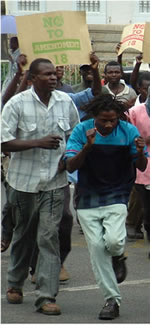You, my friend, are a rapist
Monday, December 10th, 2007 by Amanda AtwoodA few months back, I was sent a copy of off our backs – the feminist newsjournal. It’s a raw, angry take on gender, society and women’s issues, and I loved it.
The magazine includes a feature with Kim, the woman who, in 2005 started a blog called The Den of the Biting Beaver, where she published her views on life, feminism, rape and sexual assault. She published pieces such as this one, entitled The Rapist Checklist, which includes points such as:
1. You are a rapist if you get a girl drunk and have sex with her.
2. You are a rapist if you find a drunk girl and have sex with her.
3. You are a rapist if you get yourself drunk and have sex with her. Your drunkeness is no excuse.
13. You are a rapist if you “nag” her for sex. Because you manage to ply an eventual “yes” from a weary victim doesn’t mean it’s not rape. You are a rapist.
26. If you’re a friend of hers, you can still be a rapist.
27. If you had sex with her the night before but she doesn’t want morning sex and you pressure her for it anyway, then you’re a rapist.
28. If you’re her husband, you can still be a rapist.
30. If she’s had sex with you hundreds of times before but doesn’t want to on the 101st time, then you’re a rapist.
40. If she has fucked every man in a 10 square miles radius and she doesn’t want to fuck you and you have sex with her anyway, then you’re a rapist.
Comments to her blog after posts such as these were so angry, violent and threatening, that Kim eventually stopped blogging, terrified into silence.
The Rapist Checklist might be graphic, vivid and even offensive to some. But it makes an important point, and it does so with the rawness and power that fighting sexual abuse needs.
As 16 Days of Activism draws to a close again this year, Ive been thinking about what would really make a difference in the battle against gender violence. According to a recent article in the Mail & Guardian, “the Human Sciences Research Council has found in community-based prevalence studies that one in two South African women will be affected in some way by domestic violence. Does this mean that one in every two South African males is guilty of some form of violence against women? Crime analyst Anthony Altbeker says he would be ‘very surprised if it was less than 40% of men who are perpetrators of violence against women — it is probably a good deal higher’.”
If that’s the case, if 40% or more of men are themselves perpetrating violence, where is the pressure on them to stop? Where are the examples or the social mores that make such behaviour unacceptable? In their absence, maybe a bit of raw anger, free of the niceties of polite conversation and tactful euphemism, can go a long way.










